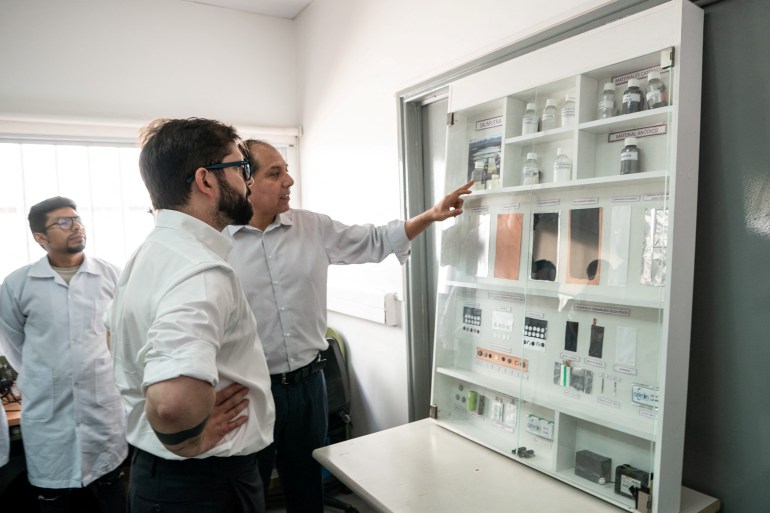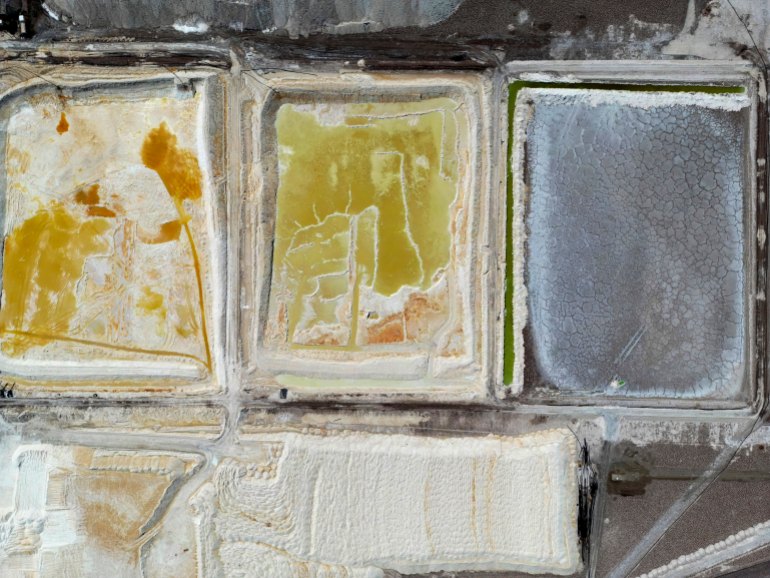Santiago, Chile – It’s white – not yellow – but like gold, lithium has quickly become one of the most sought-after precious metals on Earth. Theoretically you can find it almost everywhere, but in practice lithium is best extracted from salt pans.
This explains why lithium fever is spreading across what is known as the lithium triangle, the salt flats of Chile and neighboring Bolivia and Argentina. They account for about 60 percent of the world’s known reserves of lithium, according to the World Economic Forum. Of the three, Chile is currently the largest producer.
Driven by the global transition to green energy, the price of the light, salt-like metal used for batteries in electric vehicles and mobile phones rose from $14,000 a ton last year to more than $80,000 in November. And while prices have fallen to less stratospheric levels, some estimates predict a 40-fold increase in demand for lithium by 2040.
That is why Chile’s President Gabriel Boric sent shockwaves through the new energy metals sector when he announced his long-awaited National Lithium Program in a prime-time address on national television on April 20.
It calls for the creation of a state-run lithium company that will promote, expand and control the country’s industry. (Chile is already the world’s second largest producer after Australia.)

“We want Chile to become the world’s largest producer of lithium while protecting the biodiversity of the salt flats,” Boric said. “This is the best opportunity we have to transition to a sustainable and developed economy.”
Boric said the state will control 50.01 percent of shares in joint ventures with private investors. Current contracts will be respected, but new contracts will have to agree to terms including using state-of-the-art technology to reduce or eliminate environmental damage, better conditions for workers, and consulting mostly indigenous local communities in the Atacama Desert region, so that too they can benefit from the mining of lithium.
“How is it possible that the people who live in the regions that produce the greatest wealth in the country are also the poorest in the country?” Boric asked.
The plan includes establishing a national lithium institute to find ways to identify and produce value-added derivative products.
Chile, for example, “can already produce lithium carbonate and lithium hydroxide,” said Jose Miguel Benavente, vice president of CORFO, Chile’s economic development agency, referring to two compounds used to make batteries for electric vehicles. But, he told Al Jazeera, further refining the lithium can increase the element’s value: “After extracting lithium chloride, each additional process or product increases its value by about 15 percent, which is no small amount.”

The Chilean government’s announcement received mixed reactions, especially in Chile, where conservative politicians accused the left-wing president of wanting to turn back the clock to the days of former socialist president Salvador Allende, who was overthrown in a 1973 military coup. . Allende nationalized Chile’s copper industry, today the largest in the world.
Immediately the world headlines announced that Boric was “nationalizing” Chile’s lithium. But in fact, unlike copper, the Constitution already defines lithium as a strategic mineral exclusively owned by the state, due to its potential use in nuclear fusion.
Boric acknowledged that the private sector and many conservative economists may be wary of his plan.
“I could have just left things as they were and did nothing, avoiding problems. But I don’t think that’s the best way to rule. We have one goal and that is to create well-being for the people of Chile,” Boric said at an international mining fair on Monday.
Boric’s ambitious social programs need funding and lithium is clearly the new white gold.
For decades, the state has made generous concessions to private companies, such as the world’s largest lithium producer, Albemarle Corporation, which, along with the second largest producer, Sociedad Química y Minera de Chile (SQM), operates in the giant salt flats of Atacama . SQM’s contract expires in 2030. Shares of both companies fell on news that they will have to give up their majority stake, if and when their contracts are renewed.
Commenting on Chile’s new policy, Tesla CEO Elon Musk tweeted: “Lithium ore is very common on Earth. What matters is refining capacity.” He’s not wrong. Not all lithium is created equal. Knowledge and technology are important, but so is the source of the lithium.

“You can get lithium out of the ocean, but it’s very expensive,” Benavente said. “We have a big advantage over Italy, the United States and Australia that produce lithium from rocks because we can literally just grab it. Sure, it’s more complicated, but in relative terms, it’s much easier and much more cost-effective — and therefore profitable — to extract lithium from salt flats in the desert. You just smear it on and let it dry. Therefore, the profit margin here is much higher than in Australia, which is currently producing more, but at a much higher cost.”
The government says it will present the final bill to establish the national lithium company in the second half of this year. While it is being established, CODELCO, the state-owned copper company that is now the largest copper producer in the world, will be in charge of launching the company. Hundreds of foreign companies interested in investing in Chilean lithium are already showing interest, government sources have told Al Jazeera.
Aside from the Atacama salt flats, President Boric says Chile will provide opportunities for private companies to invest in at least a dozen smaller but still important lagoons and salt flats in other areas.